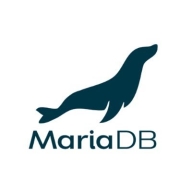

SQL Server and MariaDB compete in the database management category. SQL Server holds an edge with its seamless integration with Microsoft's ecosystem and extensive enterprise features.
Features: SQL Server excels with its scalability and administration capabilities through tools like SQL Server Management Studio and Visual Studio Code. It offers Always On Availability Groups for high availability and advanced security features. MariaDB is renowned for being open-source and cost-effective, an excellent MySQL alternative with strong replication features and support for structured and unstructured data.
Room for Improvement: SQL Server is challenged by high costs and complex setups, with occasional performance issues on massive data sets. Licensing complexity and added expenses for advanced features are noted concerns. MariaDB needs enhancements in clustering and replication, handling complex queries, and offering more robust technical support.
Ease of Deployment and Customer Service: SQL Server is broadly deployed in hybrid and on-premises setups, thriving on its integration with Microsoft's offerings. Deployments are straightforward, but support experiences can vary widely. MariaDB offers simple deployments in public and private clouds, providing community-driven support despite lacking a broad support network.
Pricing and ROI: SQL Server's higher pricing is offset by its comprehensive enterprise features and ROI is boosted through efficient data management in the Microsoft ecosystem. Conversely, MariaDB delivers cost savings as a free solution, appealing to those avoiding licensing fees, though paid support could impact ROI in complex scenarios.
All applications need our repository to provide services for our online business or our customers, so the return is good.
Compared to MongoDB, there are some platform deficiencies, but the support team shouldn't bear that burden.
When we created support tickets, the experience was very positive.
The server where we installed it has grown from 64 gigabytes in RAM to 256 gigabytes, demonstrating significant scalability capabilities.
We haven't found issues with the stability of MariaDB.
MariaDB is scalable and easy to scale.
When we consider the price for replication in another site, the pricing becomes prohibitive.
I would appreciate using Microsoft Pro as it can integrate with Excel or, with a simple query, consume information from the database using Microsoft Excel.
MariaDB is in the pricey range, especially for huge databases handling terabytes of data.
Configuration, setup, and schema design are good features in MariaDB.
The best features of SQL Server are availability and stability.
I have been working with SQL Server for a long time, and it works well for me as I am using it in different applications, such as web applications, Windows applications, or the data warehouse reporting.
| Product | Market Share (%) |
|---|---|
| SQL Server | 14.6% |
| MariaDB | 5.5% |
| Other | 79.9% |


| Company Size | Count |
|---|---|
| Small Business | 27 |
| Midsize Enterprise | 12 |
| Large Enterprise | 25 |
| Company Size | Count |
|---|---|
| Small Business | 121 |
| Midsize Enterprise | 58 |
| Large Enterprise | 112 |
MariaDB is an open source relational database created by the original founders of MySQL. It is considered one of the most popular and trusted database servers throughout the world. MariaDB is a valued component found in most cloud offerings and is the default in many Linux tools. It is also widely used by Wikipedia, WordPress, and Google, among other well-known sites. Maria DB easily melds data into concise information from a vast array of applications, such as banking, online shopping, websites, and more.
MariaDB was originally created to improve MySQL performance. It is the most widely chosen database server due to the solution being super fast, robust, user-friendly, and easily scalable. MariaDB also offers a substantial ecosystem of plugins, storage engines, and numerous other valuable tools that make it very attractive for a significant offering of use cases.
The solution’s newest functionalities include compatibility with Oracle Database and Temporal Data Tables, and advanced clustering with Galera Cluster 4, which make it easier for users to research data history from any point in the past. Additionally, the most recent versions include JSON and GIS features. MariaDB is committed to staying an open source solution.
MariaDB Features
Reviews from Real Users
Faustine C., Engineering Supervisor- Corporate Data Solutions and Services at TZ Telecoms Corporation, shares, “The software provides a lot of information on what is happening inside the database. For most performance parameters it is easy to know if something is not right in the configuration or optimization which helps engineers take remedial fine-tuning measures. For example, if the database is underperforming it is easy to know which performance parameter can be adjusted to handle the workload. It is difficult to troubleshoot database issues if many performance parameters can not be monitored or debugged which is the case with some database management systems. It provides great monitoring of data storage, processing, and performance stability which is really important for real-time data storage and processing. It's a user-friendly product.”
A PeerSpot user who is a Senior Engineer at a tech services company relates, “ The solution's high availability is its most valuable aspect. We have found the product to be stable and the initial setup is pretty simple. I'd rate the solution at a ten out of ten. I'm very happy with it overall. I would recommend the solution to others. It's easy to find details about the product online and to learn about it.”
SQL Server is a relational database management system (RDBMS) by Microsoft. The product's main purposes are to store data and retrieve it as requested by other software applications - on the same computer or on another computer across a shared network. The solution is built on top of Structured Query Language (SQL), which is a standardized programming language used for relational database management.
The product is tied to Transact-SQL (T-SQL), which is an implementation of SQL from Microsoft that adds several proprietary programming extensions to the standard language. SQL Server is built similarly to other RDBMS products, as its structure is a row-based table that connects related data elements in different tables to one another. One of its most important components is the SQL Server Database Engine, as it controls data processing, storage, and security. Beneath the Database Engine is the SQL Server Operating System, which is used for memory and I/O management, locking data to avoid unneeded upgrades, and job scheduling.
The solution has four editions with different sets of services and tools. They include:
The first two are available for free and are typically utilized by smaller companies, as they work with fewer functions and storage. The second two editions are generally used by bigger organizations and enterprises and offer more features.
The solution has several functions through which users can facilitate different data-related processes. These include:
SQL Server Services
SQL Server has a wide range of add-on services that provide additional benefits beyond database management. These services include:
SQL Server Benefits
The solution has many benefits for users. These include the following:
Reviews from Real Users
A president at a consultancy evaluates SQL Server as a veteran solution with critical log shipping feature.
Harkamal S., a user at a manufacturing company, rates SQL Server with a high mark because it is a stable, scalable, and easy-to-deploy solution that pretty much covers everything.
We monitor all Relational Databases Tools reviews to prevent fraudulent reviews and keep review quality high. We do not post reviews by company employees or direct competitors. We validate each review for authenticity via cross-reference with LinkedIn, and personal follow-up with the reviewer when necessary.